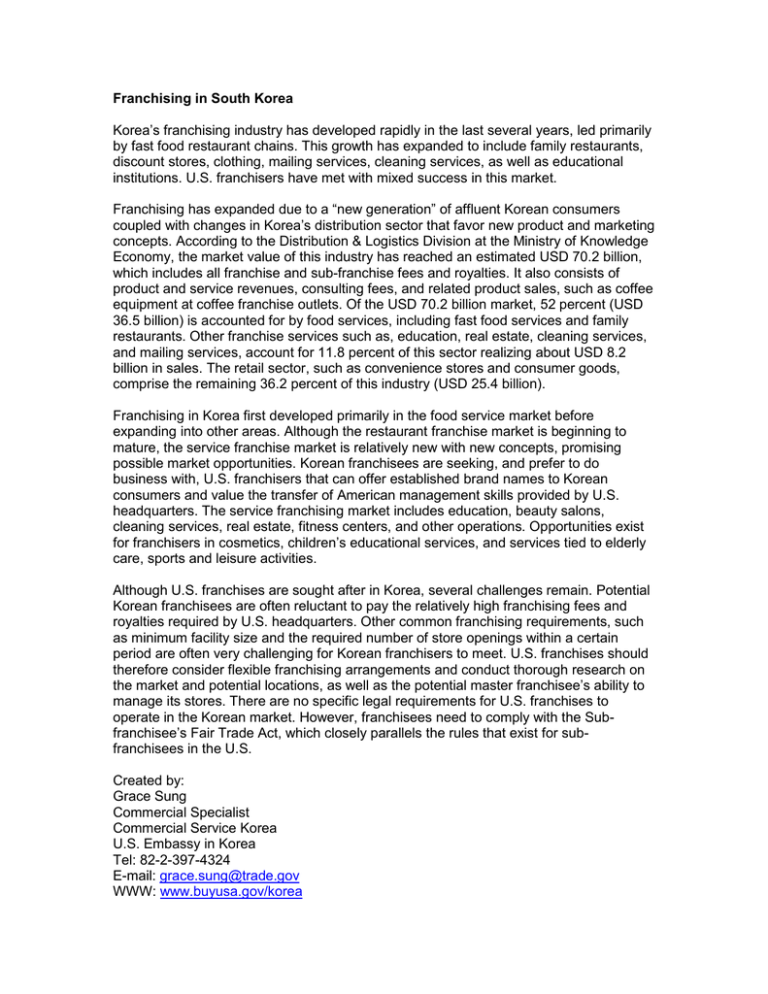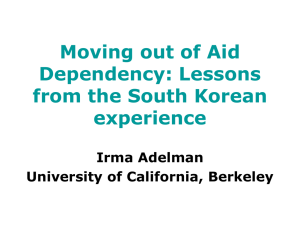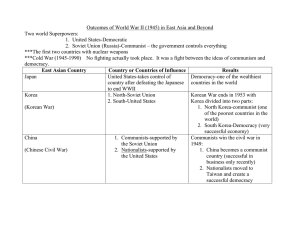Franchising in South Korea
advertisement

Franchising in South Korea Korea’s franchising industry has developed rapidly in the last several years, led primarily by fast food restaurant chains. This growth has expanded to include family restaurants, discount stores, clothing, mailing services, cleaning services, as well as educational institutions. U.S. franchisers have met with mixed success in this market. Franchising has expanded due to a “new generation” of affluent Korean consumers coupled with changes in Korea’s distribution sector that favor new product and marketing concepts. According to the Distribution & Logistics Division at the Ministry of Knowledge Economy, the market value of this industry has reached an estimated USD 70.2 billion, which includes all franchise and sub-franchise fees and royalties. It also consists of product and service revenues, consulting fees, and related product sales, such as coffee equipment at coffee franchise outlets. Of the USD 70.2 billion market, 52 percent (USD 36.5 billion) is accounted for by food services, including fast food services and family restaurants. Other franchise services such as, education, real estate, cleaning services, and mailing services, account for 11.8 percent of this sector realizing about USD 8.2 billion in sales. The retail sector, such as convenience stores and consumer goods, comprise the remaining 36.2 percent of this industry (USD 25.4 billion). Franchising in Korea first developed primarily in the food service market before expanding into other areas. Although the restaurant franchise market is beginning to mature, the service franchise market is relatively new with new concepts, promising possible market opportunities. Korean franchisees are seeking, and prefer to do business with, U.S. franchisers that can offer established brand names to Korean consumers and value the transfer of American management skills provided by U.S. headquarters. The service franchising market includes education, beauty salons, cleaning services, real estate, fitness centers, and other operations. Opportunities exist for franchisers in cosmetics, children’s educational services, and services tied to elderly care, sports and leisure activities. Although U.S. franchises are sought after in Korea, several challenges remain. Potential Korean franchisees are often reluctant to pay the relatively high franchising fees and royalties required by U.S. headquarters. Other common franchising requirements, such as minimum facility size and the required number of store openings within a certain period are often very challenging for Korean franchisers to meet. U.S. franchises should therefore consider flexible franchising arrangements and conduct thorough research on the market and potential locations, as well as the potential master franchisee’s ability to manage its stores. There are no specific legal requirements for U.S. franchises to operate in the Korean market. However, franchisees need to comply with the Subfranchisee’s Fair Trade Act, which closely parallels the rules that exist for subfranchisees in the U.S. Created by: Grace Sung Commercial Specialist Commercial Service Korea U.S. Embassy in Korea Tel: 82-2-397-4324 E-mail: grace.sung@trade.gov WWW: www.buyusa.gov/korea




